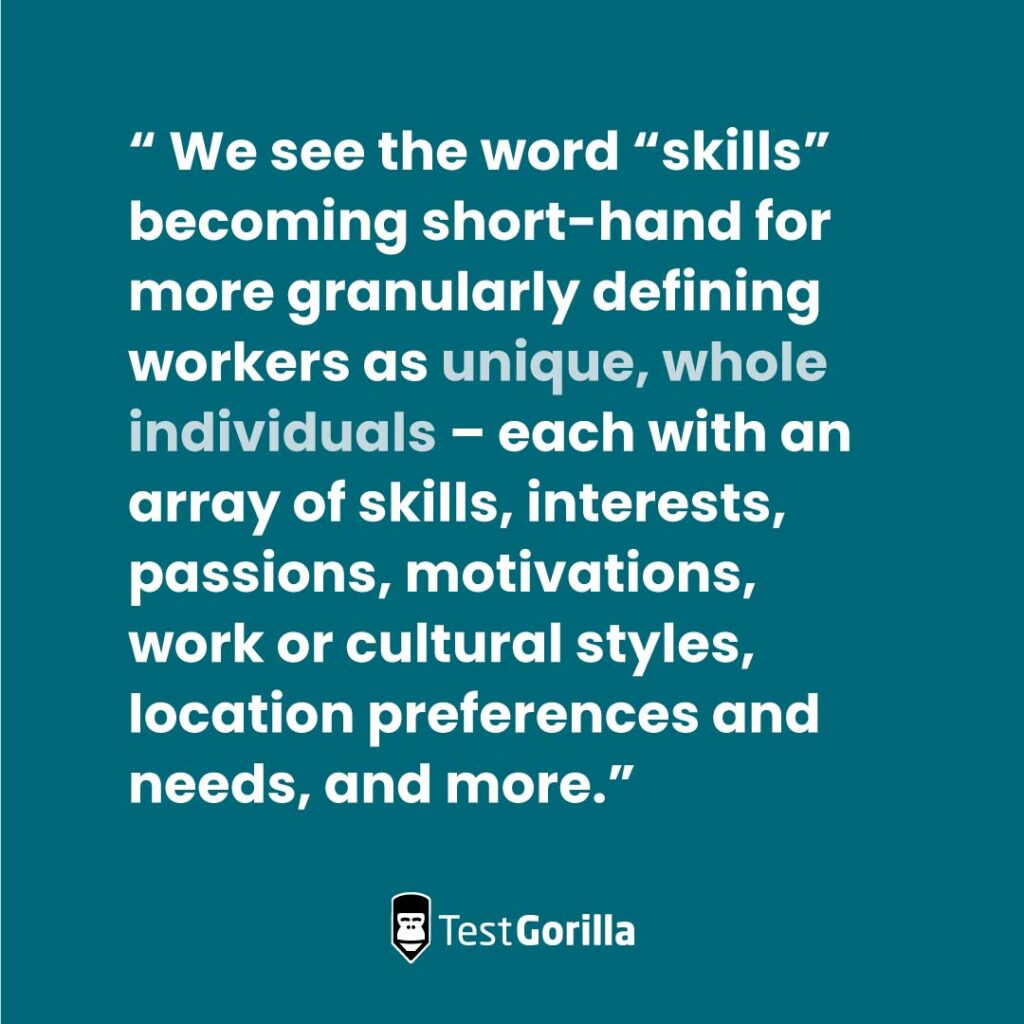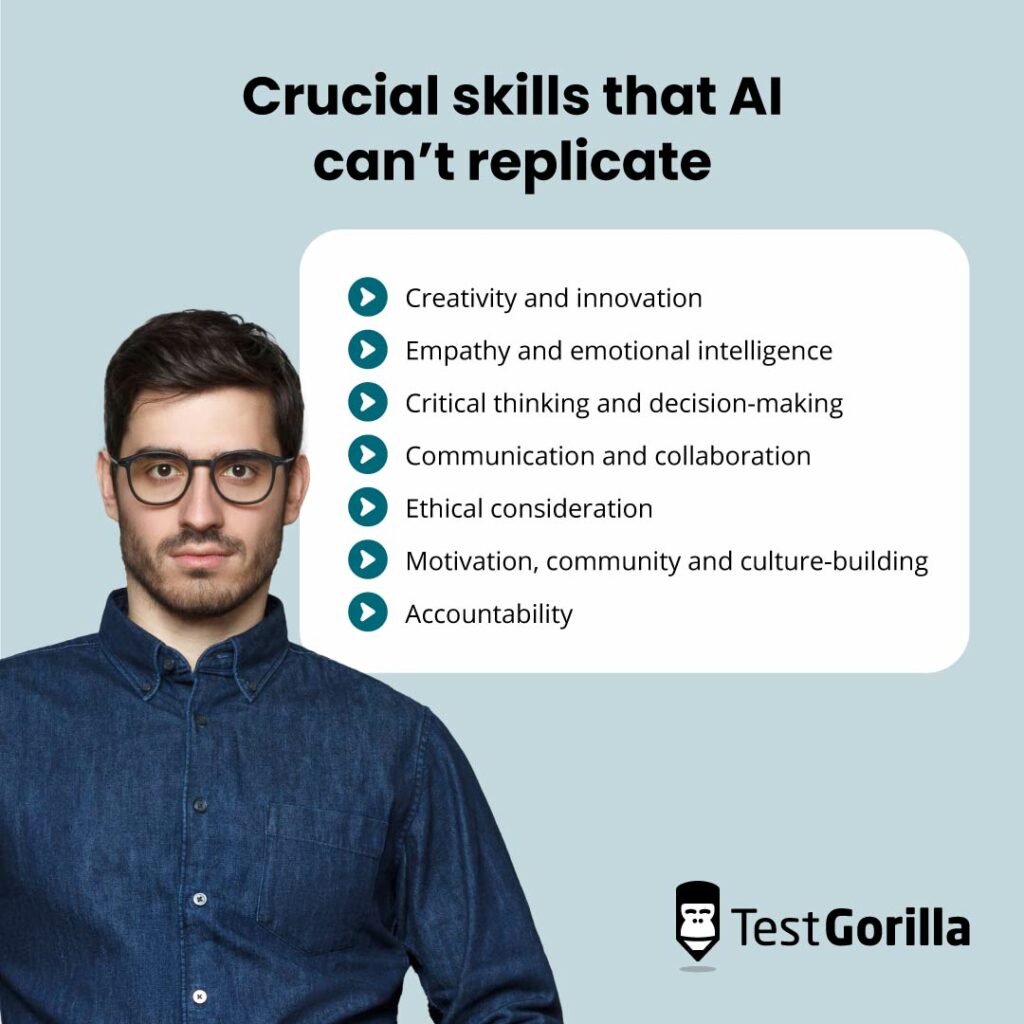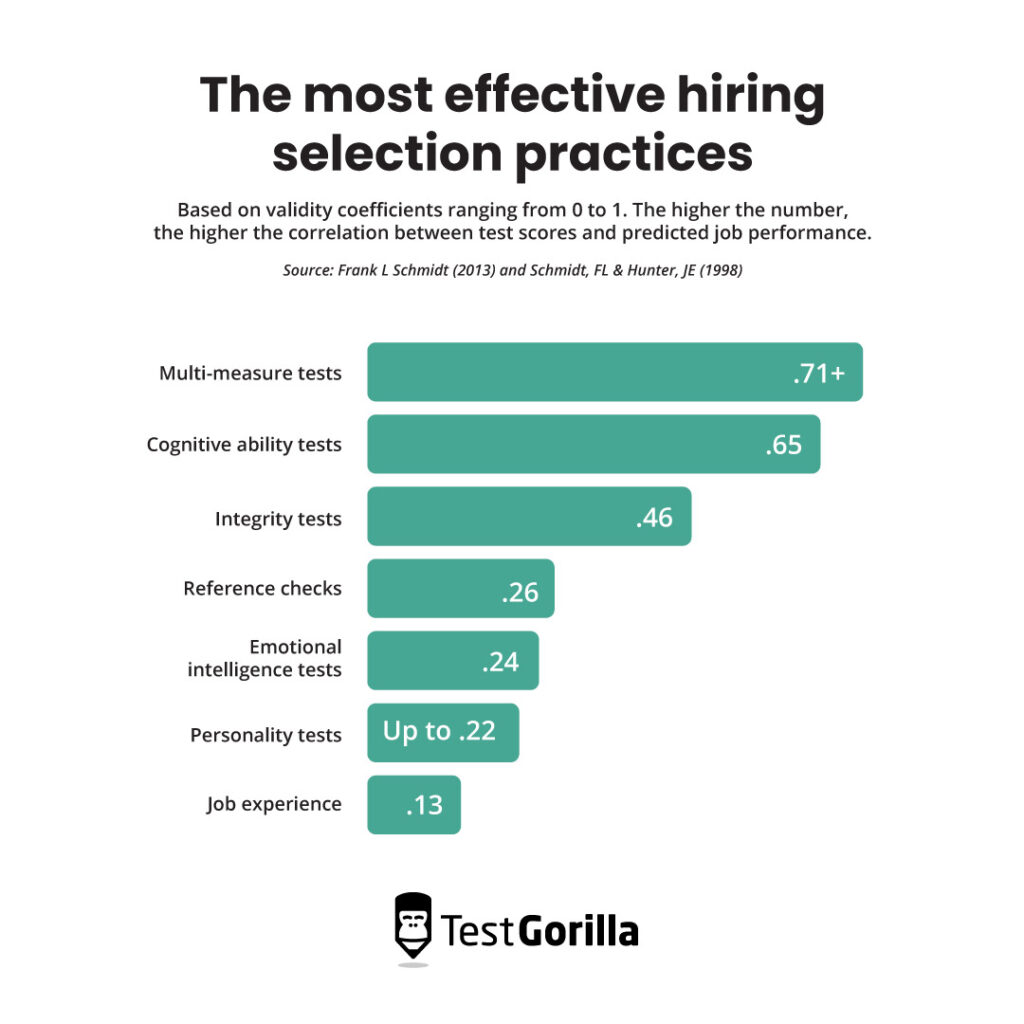AI is changing the world of work, and fast. The remit of what AI can do now is growing, and its potential for the future is beginning to feel somewhat boundless. Amidst the AI craze, its ability to replicate certain human skills stands out as something that we, as advocates of skills-based hiring, want to address.
The rise of AI tools like ChatGPT has raised questions about which skills will be replaced and which skills we should continue to invest in. It has also triggered a wave of paranoia amongst workers (will AI take my job?) and an onslaught of productivity-related content about the “skills you no longer need to learn” and the “things you no longer need to do yourself.” One euronews article suggests writing and art design are skills we might skip learning entirely.[1]
So here’s the thing. We know that the future of hiring is skills-based, and we know that many organizations are indeed implementing skills-based hiring. But we also know that, in the minds of many employers and employees, some skills have entered an AI-induced jeopardy. The question for employers is no longer “should I hire for skills?” – instead, they must consider a new and important question:
How do I hire for skills in the era of AI?
We happen to have a big take on this one. Let’s dive in.
Table of contents
Will AI make certain skills obsolete?
We’ll begin by asking the question that’s at the top of everyone’s list of FAQs. Will AI make certain skills obsolete? Could it replace humans in the workplace?
This is a nuanced topic, and there isn’t a straightforward answer. But fear-mongering aside, AI is to be embraced, rather than ignored. Here’s why:
AI has a place in the future of work
Generative AI – which refers to tools like ChatGPT that can intelligently create content – can help professionals with time-consuming tasks. For talent acquisition professionals, that might mean drafting job descriptions and personalized messages to candidates. For content writers, it might mean beating blank page syndrome by generating some basic copy on the topic they’re tackling. It can save them time in the same way that Grammarly might help them proofread more quickly.
This doesn’t mean that these skills – writing and proofreading communications and copy – become obsolete. It simply means that professionals now have the option to leverage AI in order to do things more quickly and efficiently. Like Grammarly, ChatGPT isn’t perfect – it’s not going to produce a piece of writing with the same flare, creativity, and originality that a skilled writer’s work would have.
Machine learning and artificial intelligence are also becoming increasingly crucial tools in the domain of data science and analysis. And as well as copy, ChatGPT can also write code. The logic here is the same: ChatGPT is just another tool at the disposal of developers, in the same way that StackOverflow is.
In this instance, too, no skills become obsolete, and no human is replaced. The key to making the most of AI tools - and avoiding creating mediocre employees - is to have humans around who can use them innovatively and effectively to do their work faster or better.
Hiring people who are skilled at using AI tools is a really valid thing for employers to do; likewise, learning how to use AI to work efficiently is a sound investment of your time as a candidate or employee. AI-related skills tests will be crucial here – hint hint: we’re working on it!
But so do skills – the human kind
It’s simplistic to say that AI will ‘replace’ people’s jobs. This narrative is driven by the widespread sensationalization of AI, the novelty of which is still fiercely intact – especially when it comes to natural language processing (NLP) tools like ChatGPT.
A job, surely, is more than a handful of skills anyway. There are certain skills that AI can (with the help of a human) feasibly replicate, but a job is also a network of relationships and teamwork. A job is also negotiating conflict. A job is solving complex, frustrating, or emotionally charged problems with fellow human beings, and approaching them with empathy and creativity. No technical skill exists in a vacuum – the way that humans apply their technical skills is vital to every workplace.
The rise of AI is, then, a juncture for us all – employers, employees, and candidates alike – to think more holistically about skills and talent.
Take, for example, this definition of skills from Deloitte:
“We broadly define “skills” to encompass “hard” or technical skills (such as coding, data analysis, and accounting); human capabilities or human skills (such as critical thinking and emotional intelligence); and potential (including latent qualities, abilities, or adjacent skills that may be developed and lead to future success). Eventually, we see the word “skills” becoming short-hand for more granularly defining workers as unique, whole individuals – each with an array of skills, interests, passions, motivations, work or cultural styles, location preferences and needs, and more.”
Technical skills are only one part of the picture
Technical skills, which can be replicated and sometimes exceeded by AI, are only one part of the talent picture. Talent has soft skills, empathy, creativity, personality, and presence – all things that are crucial for success in the workplace despite not sitting so snugly inside of what we traditionally think of as “skills”.
To quote our Assessment Manager Romina da Costa, Ph.D., “there are a lot of crucial skills that AI can’t replicate.” Romina has scoped out a few of these below:
Creativity and innovation: People bring new ideas and perspectives to the table, and use their creativity and problem-solving abilities to come up with unique solutions to complex problems.
Empathy and emotional intelligence: People are able to understand and anticipate the needs and concerns of users and stakeholders, and design solutions that are tailored to their needs.
Critical thinking and decision-making: People can analyze complex information, evaluate different options, and make sound decisions based on the available data.
Communication and collaboration: People are able to effectively communicate with other members of their team, as well as with stakeholders and clients. They can collaborate and work effectively with others to achieve a common goal.
Ethical consideration: People can deeply consider the ethical and societal implications of the product they are building or the services they are offering, and make sure to build or offer them responsibly.
Motivation, community and culture-building: No matter the job a person does, they are an agent in creating and building a community and a culture within their workplace.
Accountability: People can be held, and can hold themselves accountable when they get something wrong.
This list is by no means exhaustive – but you get the picture. When we define skills and talent more holistically, and less mechanically, it’s clear that our skills are not, as mass media might have us believe, in jeopardy due to AI.
What AI really means for skills-based hiring
Let’s distill all of this and come back to our original question. What does it mean to hire for skills in the era of AI?
In theory
For one thing, as we just discussed, it means we need to change the way that we think about skills.
Each employer who starts thinking holistically about skills takes us one step closer to a world where skills are “short-hand for more granularly defining workers as unique, whole individuals” – where each person’s “array of skills, interests, passions, motivations, work or cultural styles, location preferences and needs” are taken into account. And when we begin to understand skills this way, we realize that AI doesn’t come close to replacing them.
In practice
Theory is one thing. Putting theory into practice is another.
Approaching skills holistically means practicing skills-based hiring holistically. It’s not enough to send your frontend engineer candidates a few coding tests. Employers need to implement multi-measure testing that accounts for a holistic understanding of skills and, as a result, the human beings sitting on the other side of that assessment.
Of course, it’s still important to only test for skills that are relevant to the role – you don’t need to be chucking your prospective developers a Customer service test. But you should be assessing their communication skills, their critical thinking, their culture add potential, and maybe even their motivation, depending on the soft skills or qualities that are most important to your workplace.
This is a justified clarion call. We see many employers who use TestGorilla for hiring building assessments that only include technical skills tests. Although we appreciate that every hiring situation is different, this is not the optimal way to use our product. Our tests aren’t developed to be used in isolation to make hiring decisions, and data shows that it is simply not the best way to use them.
Research shows that multi-measure testing offers a stronger predictor of job success than any one kind of test on its own. A holistic hiring process, that focuses on a candidate as a whole and takes into account more than their technical skillset, is the best recipe for a successful hire. As an added bonus, it helps you identify people who have AI-related skills and are interested and driven enough to keep them up-to-date.
3 ways employers can stay abreast of AI (and still hire for skills)
In summary, here are three actionable things you can do to stay abreast of AI’s encroachment on certain skills and hire the best candidates – without worrying about which of their skills may or may not be obsolete.
1. Start thinking about skills holistically
The only way to successfully hire for skills in the era of AI is to think more holistically about what skills really mean.
2. Implement multi-measure testing
If thinking about skills holistically is the theory, using multi-measure testing in your hiring process is the practice. Multi-measure testing is your best bet for predicting job success and evaluating candidates as the unique, whole individuals that they are.
3. Hire or train people who can make the most of AI
If you are interested in leveraging AI tools to replace certain tasks in your workplace, focus on hiring and training people who can use them wisely and effectively. This is becoming an increasingly relevant skill in itself for many professionals – and prompt engineering is supposedly now one of the most lucrative careers out there.
The case is strong for skills testing in the era of AI
As organizations continue to use talent assessments for hiring, and as AI continues to take the world by storm, the case for skills-based hiring is stronger than ever.
The only twist? If we don’t start thinking more holistically about skills, and using skills tests accordingly, we’re not making the most of the exciting hiring tools that we have at our disposal – and we’re not doing talent justice.
Are organizations up to the challenge? We think so. Only time will tell.
Want to learn more about hiring holistically? Read our best practices for using skills testing as part of the holistic hiring process.
Sources
Imane El Atillah, ‘How AI can save you time: 5 skills you no longer need to learn’, accessed June 21st 2023: https://www.euronews.com/next/2023/05/20/how-ai-can-save-you-time-5-skills-you-no-longer-need-to-learn
Related posts
Hire the best candidates with TestGorilla
Create pre-employment assessments in minutes to screen candidates, save time, and hire the best talent.
Latest posts
The best advice in pre-employment testing, in your inbox.
No spam. Unsubscribe at any time.

Hire the best. No bias. No stress.
Our screening tests identify the best candidates and make your hiring decisions faster, easier, and bias-free.
Free resources
This checklist covers key features you should look for when choosing a skills testing platform
This resource will help you develop an onboarding checklist for new hires.
How to assess your candidates' attention to detail.
Learn how to get human resources certified through HRCI or SHRM.
Learn how you can improve the level of talent at your company.
Learn how CapitalT reduced hiring bias with online skills assessments.
Learn how to make the resume process more efficient and more effective.
Improve your hiring strategy with these 7 critical recruitment metrics.
Learn how Sukhi decreased time spent reviewing resumes by 83%!
Hire more efficiently with these hacks that 99% of recruiters aren't using.
Make a business case for diversity and inclusion initiatives with this data.






















